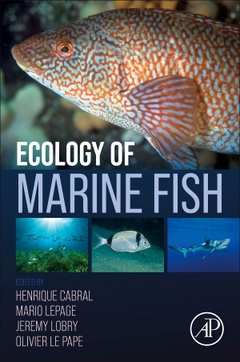Ecology of Marine Fish
Coordonnateurs : Cabral Henrique, LePage Mario, Lobry Jeremy, Le Pape Olivier

Each chapter provides and in-depth review of the science behind marine fish populations and the methodological tools to the study them.
2. The diversity and life history patterns of marine fishes
3. Methods for estimating the occurrence and abundance of marine fishes
4. Spatial and temporal patterns in the distribution of fishes
5. Modelling fish species richness and abundance
6. Fish movements
7. Trophic ecology of fishes
8. The role of fish in marine food webs
9. Fish growth patterns and relationships with environmental variables
10. Modelling fish growth
11. Reproduction of marine fishes
12. Early life stages of marine fishes
13. Fish nurseries
14. Behaviour of marine fishes
15. Fish populations’ connectivity: methods, patterns and applications
16. Genetic structure of marine fish populations
17. Methodological tools to the study of marine fish communities
18. Main typologies of marine fish communities
19. Functional diversity in marine fish assemblages
20. Quantifying human pressures affecting marine fishes
21. Effects of pollutants in marine fishes
22. Fisheries impacts on marine fish populations
23. Climate change impacts on marine fish populations and communities
24. Fish as indicators
25. Conservation of marine fish
26. Marine Protected Areas as a tool for fish conservation
27. Restoration of fish habitats, populations and communities
28. Future perspectives in the study of fish ecology
Dr. Mario Lepage is a senior fish biologist at the Institute of Research and Technology in Environment and Agriculture. His work mainly deals with fish ecology in estuarine environment in Europe but also in French Guiana. ~49 publications, invited speaker at marine conferences.
Dr. Jérémy Lobry is a senior marine biologist at the Institute of Research and Technology in Environment and Agriculture. He is co-directing a research unit on Aquatic Ecosystems and Global Changes. His specialty is trophic networks, focusing on fish compartments, published ~50 articles, invited speaker at marine conferences.
Dr. Le Pape’s research interests include identifying and protecting essential fish habitats in estuarine and coastal areas, studying anthropogenic pressure on fish habitats, and assessing avenues for fish population renewal. He is Professor of Marine and Coastal Ecology at L’Institut Agro Rennes-Angers, and represents the institute as Vice-Director of UMR DECOD, a joint research unit combining teams from INRAE, Ifremer, and L’Institut Agro to study ecological and evolutionary processes in aquatic environments.
- Provides the latest scientific research and development in the field
- Presents a wide scope of different methodological approaches useful for field studies
- Includes information on the role of marine fish in food webs and the impacts of climate change
Date de parution : 11-2024
Ouvrage de 300 p.
15x22.8 cm
Thème d’Ecology of Marine Fish :
Mots-clés :
Functional ecology; global changes; Bioindication; fisheries industries; fisheries management; climate change; fisheries organization; food security; globalization; sustainability; marine biology; value chain; food chain; food economy; fish culture; fishery operations; aquaculture; marine pollutants



